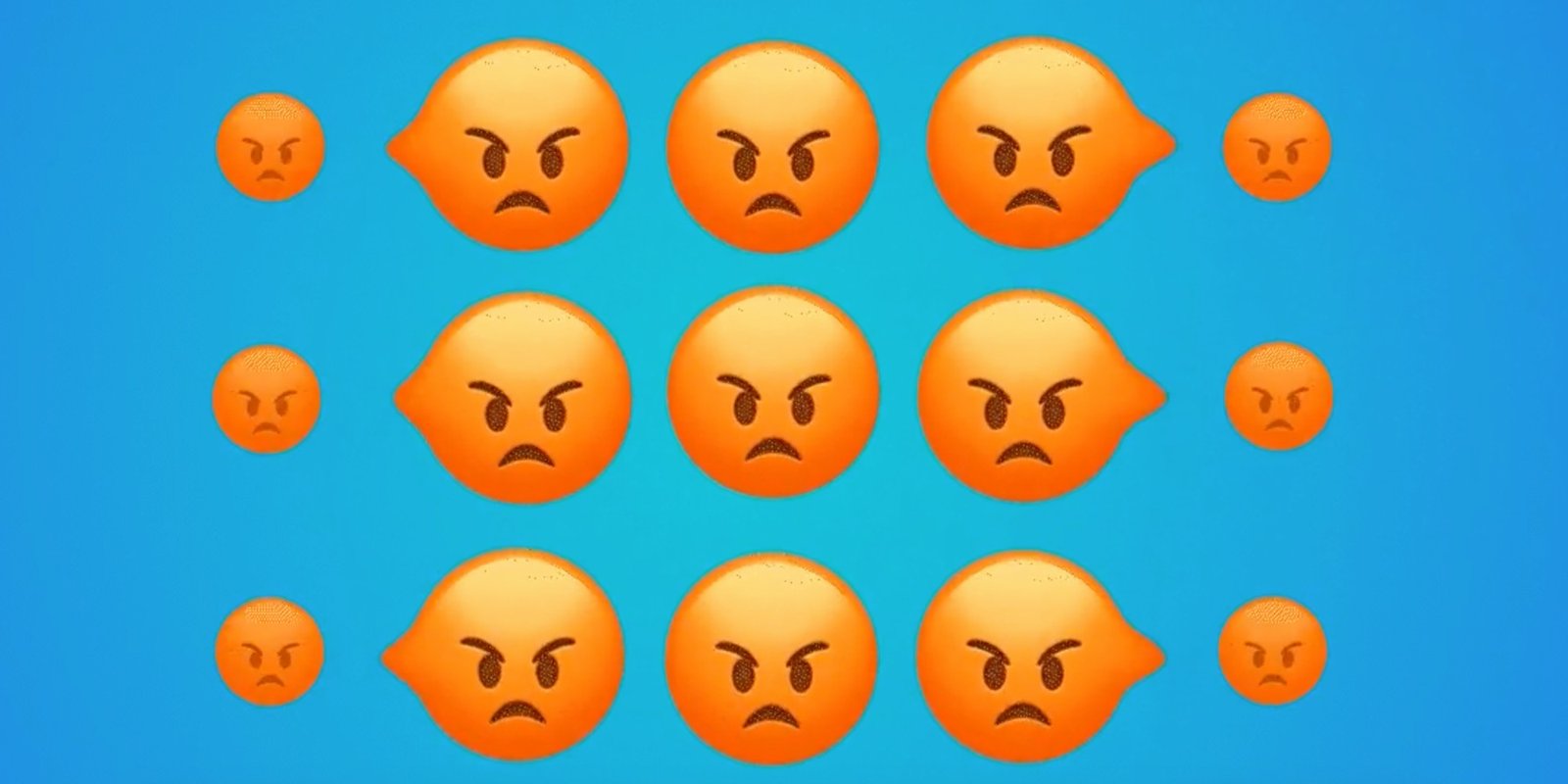emojipedia; Rebecca Zisser/Insider
For about a year, barista and TikToker Ryan Gawlik has been intentionally angering people with his coffee-themed content.
In TikTok videos, Gawlik mistakenly calls espresso “espresso” or bites into an entire KitKat bar because he knows it will infuriate an internet that finds this kind of behavior viscerally upsetting.
This is harmless, but it's also become a sort of proven growth hack for maintain his careerSince he started posting inflammatory content—posts meant to rile people up a bit or provoke arguments in the comments—engagement has increased fivefold, he told Insider.
He's also gained over 350,000 followers (currently at 1.2 million), and he can feel a little more confident about his social media career.
Gawlik is one of the growing number of tikyokers who incite anger, both low and high, to gain views. Some call it "rage farming" or "rage baiting."
Whatever the name, it's been used since the early days of social platforms to keep users engaged. Social media anthropologists claim it's a proven technique for increasing followers in an attention-based economy. This is because generating engagement, positive or negative, is a currency.
But the silent struggle to gain followers has become more controversial in recent months. Insider spoke with seven creators who are part of TikTok's new Pulse revenue-sharing program. This program rewards them with half of the revenue generated by placing ads on their feeds. But this reward only granted 4% of all qualifying videos.
All seven say they've noticed more rage-baiting than ever on their feeds. With TikTok's Creator Fund payments so low, the recession, and the struggle to maintain growth, TikTokers are increasing rage-bait to attract more views to their content.
It has become, as one creator put it, "a race to the bottom."
For as long as commentators have existed, people have used anger as a weapon to captivate audiences.
Social media has allowed anger to become a boundless and ever-growing force that has made its way into almost every aspect of our lives. We're angry about everything… all the time.
As writer Molly Jong-Fast noted in The Atlantic earlier this year, “rage farming is the product of a perfect storm of anger; an unholy mix of algorithms and anxiety.” Social media platforms don’t care whether the message is uplifting or toxic. As long as people engage with it, the networks will spread it further.
The creators Insider spoke to criticized far-right political commentators Ben Shapiro and Brett Cooper. They called them like a conservative Daily Wire panel with its own TikTok channel; @the_dadvocate, a woman-led account advocating for men's rights, called them rage-baiters.
But they also referred to several progressive-minded TikTokers as rage-baiters. They included Aunt Karen, who has dedicated her account to calling out and identifying racist behavior; and RX0rcist, a professional pharmacist who reports users she believes are sharing unsound medical advice.
While many of these creators built their social media careers by fueling outrage against social injustice, not all are willing to admit that it's an effective growth strategy.
Most TikTokers refute the idea that they engage in anger management. Shapiro told Insider he wasn't familiar with the term or the practice.
"I only publish material I believe in," he said in an emailed statement. "If people get upset about it, that's their prerogative."
Lauren, known as @the_dadvocate to her 1.3 million followers, doesn't think she incites anger in her TikToks because she says she sincerely stands by every point she makes.
"No, I don't do rage bait, but I'm familiar with the term," she told Insider. "For this to be true, it depends on the creator not being sincere and not really believing in the things they're talking about, and I do."
Lauren added that her videos—some of which highlight "couple shaming" of the male gender and the high standards they demand of them—are meant to make people uncomfortable. But taking strong stances on contentious gender issues unites people, not further divides them.
"I constantly receive messages from men who tell me I inspire them to be better partners to their wives, and from wives who tell me I help them understand their husbands," she says. "There are many more factors to my motivation than simply pissing people off and making money."
For 'Aunt Karen', whose real name is Denise Bradley, and Savannah Sparks, the woman behind RX0rcist, their relationship with rage farming is more complicated.
Both TikTokers vehemently deny doing so, but also assert that anger is a necessary weapon in the fight against medical misinformation and racial inequalities online.
"A lot of people think my content is rage-mongering simply because they're uncomfortable with the reality that Black people and other people of color face in this world," Bradley told Insider. "I believe in order to drive change, we have to see the world as it is. I don't believe in sugarcoating... so if people think I'm being ire-mongering, they should ask themselves, 'What is he trying to make us see?'"
Sparks told Insider that he doesn't consider his passionate reactions to misinformation and poor science to be provocative. In fact, if it is, so what? He believes he's trying to do the right thing in this world.
"Reporting on science, misinformation, and crime is not inciting anger... Inciting anger is deliberate manipulation," he says. "I'm telling the truth, and, as Drew Afualo so eloquently said, I've never claimed to be kind."
Ryan Gawlik is candid and, at times, unashamed of being an "internet rage farmer." Perhaps that's because his content is less risky than others.
"If it were an apple pie, I'd say pumpkin pie or something, which is nonsense. And I'd get the title wrong, and I'd use the hashtags, or I'd react to things wrong," she said.
Gawlik started doing this when he experienced two major challenges that almost all creators face at some point: his follower growth began to decline, and people started trolling him for making mistakes, initially unintentionally. He says he was harassed in 2021 for a matcha tutorial he posted that forgot to include a step to pre-wet the whisk.
People called him culturally insensitive, and some even showed up at his workplace to shame him for it. (Gawlik told Insider that he actually did pre-wet the whisk when he was making the video, but decided not to include the footage in the final cut because the audio was bad.)
In any case, he quickly learned the impossibly high standards people are held to on the internet:
Gawlik pitied his other creator friends when they suggested he plant his own careless mistakes in his videos. Hey, if users call you out when you're not trying to make mistakes, why not take control of that paradigm, they suggested?
"I think having the ability to understand that if you intentionally make yourself vulnerable, you can create a situation where you control the hate in a sense," she said.
His creator friends were right. He saw that his videos were receiving more comments, making them more attractive to be featured more often on For You, and soon his following grew. He even started testing his content: he'd post one video where he didn't make a silly mistake or unleash a dig to make a point, and another that was more direct, and he realized that the ones that provoked a heated response from viewers had at least three to five times more reach and comments.
"There was one situation where people corrected me so much that I got, I think, 5 million views, just for that silly thing," Gawlik explains.
Researchers at Beihang University in China found in 2013 that Weibo users shared disgust and outrage more often than content that evoked emotions like joy and sadness.
Experts explained to Insider that creators are incentivized to play with these emotional devices because that's what audiences and big social media companies want.
“The goal of social media platforms is to keep people engaged as long as possible,” says Yotam Ophir, a professor at the University of Buffalo who studies misinformation and extremism. “Ironically, it doesn’t really matter whether this attention is positive or negative… they don’t care whether we enjoy the video or get angry at it, as long as we stay, listen, comment, and share it with our friends.”
It's also why TikTok and YouTube's algorithms can serve you conservative-leaning videos even if you're more left-leaning. It's in the platforms' best interest to give you what you want and what you don't.
Ophir believes it's a fair practice if TikTokers are leveraging anger to keep up with the online economy. He pointed to the phrase "if you disagree with me, let me know in the comments" as a benign and common way creators do this every day.
Where we need to be most aware that creators do this is when they start sowing conspiracy theories and extremism.
"If we think of commentators like Ben Shapiro, when he writes something offensive on Twitter, he knows he's going to get engagement from his followers, but also from people who resist him. Some will retweet him to criticize him, others will go to the comments section to counterattack," Ophir explains.
"It's often the case that the most provocative, emotional, scandalous, and sensationalist material is what keeps us hooked. It's a sad reality. The kind of material that keeps us hooked is also racist, hateful, misinformed, and conspiratorial in nature."
And in the worst cases, the incitement of anger leaps from the screen to the real world.
From minor incidents to the politically incorrect, several TikTokers say there has been a steady increase in incitement of anger in recent months.
Cecelia Gray (@ceceliaisgray), who has more than a quarter of a million followers on TikTok, has some theories about why.
"There's been a bit of an uptick lately," Gray says. "I think it's a combination of a recent change in how TikTok was going to look at our videos for recommendation, and they started prioritizing people who understand and use SEO a little bit."
Insider has reached out to TikTok for comment.
Gray says competition to be on the Pulse show is also driving rage-baiting.
"The upswing started when people stopped seeing that instant gratification. And now that we know Pulse exists and we're all signing up for it, there's been a kind of steady incline of people saying, 'Well, I have to be the most viral.'"
Nikki Apostolou, a TikToker who speaks about body positivity and Indigenous issues, has also noticed more videos with negative content on her FYP over the past month.
"I noticed there was more aggression in general. On all topics. Many started with something negative instead of positive," she told Insider. Apostolou herself is feeling the pressure to deliver.
“If I make a video about cultural appropriation or something like that where I start by telling people they can't do something… that video usually gets a lot of views because of the discussions it starts,” he continued. “It seems like content isn't geared toward positive debate anymore. It's more about shock value. That's what gets views. That's what's pushed, so people keep repeating that formula.”
Creators want TikTok to better regulate videos that incite anger, especially those that are conspiratorial or spread outright misinformation. Danielle Kramer, a clinical sexologist who also posts sex education videos on TikTok, says the platform should employ human moderators to intervene when a video endangers people's health and safety. She also recommends verifying that users are at least 18 years old.
Ophir, however, doesn't hold social media companies accountable because they profit financially from this practice. Instead, he advises citizens to hold public officials accountable and write to them to draft regulations that create safer guardrails.
And, as the internet adage goes, it encourages people not to feed the trolls.
"People should understand that Elon Musk isn't just being provocative and enjoying it. He actually does it because it's a financially viable strategy for him," he said.
"They should be willing to say, 'I'm not going to play along with this. I'm not going to respond to any of it.'"
NOW READ: This AI app shows you what you would look like at different times in history.
ALSO READ: The EU threw a 24-hour party in its $400,000 metaverse, but hardly anyone came.
The cybercrime business will become even more sophisticated next year.
Researchers managed to create more energy than they invested in nuclear fusion.
Musk also said he will remove all verified accounts granted under the previous system in the coming months.
China's space station is an achievement that solidifies the country's position as a major space power.
The idea of creating a super app comes from Microsoft CEO Satya Nadella himself.
There are several methods you can use to identify if someone is stealing your Wi-Fi connection and stop them.
Copyright © 2021 Insider Inc. All rights reserved. Privacy Notice and Cookie Policy
International Editions:
Germany and Austria, Australia, Spain, USA, France, India, International, Japan, Netherlands, Poland, South Africa







